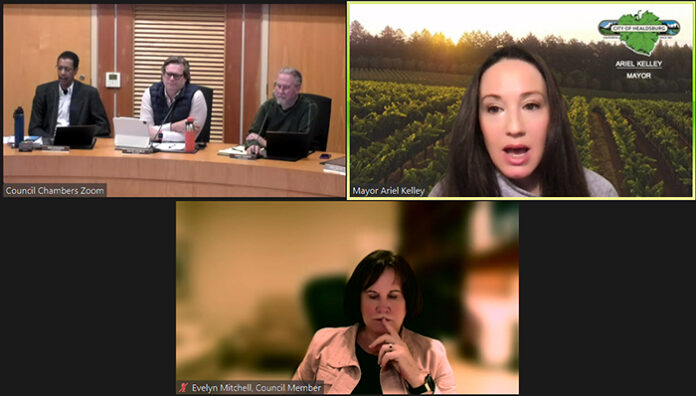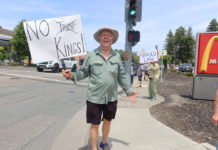
On Feb. 28, less than a week from the Tribune publication date, the local public health emergency that has been in place since March 2, 2020 to deal with the COVID-19 pandemic will be lifted, as Sonoma County Health Officer Dr. Sundari Mase announced last week.
Gov. Gavin Newsom has said the state public health emergency will expire that same day, next Wednesday. And while the federal COVID-19 public health emergency is slated to expire on May 11, at least at the local level it seems the pandemic is for all practical purposes over.
The expiration of emergency health rules surrounding the pandemic means that a number of adjustments that were made to conducting official business during the pandemic will no longer be necessary. City Manager Jeff Kay doesn’t see that many changes will result from the expiration of the health orders that haven’t already been implemented.
“We will probably see less remote participation in City Council and commission meetings, but City operations have been close to normal for many months now,” Kay said. “So things should be mostly business as usual once the emergency declaration lapses next week.”
The one item of significance was the potential reversion to pre-COVID policies about public alcohol consumption, which led the Parks and Recreation Commission to recommend new, more lenient rules for downtown city parks. That recommendation made it onto the agenda for Tuesday’s City Council meeting, placed on the Consent Calendar for quick approval.
“The rationale is that it is not a new policy but an extension of something that has been in place for a few years,” said Kay.
At the county level, Supervisor James Gore had a similar perspective. “Not really a big change for us at County, as we already moved back to in-person meetings, while offering a hybrid option of Zoom,” said Gore. “I think the biggest impact will be for special districts, and cities that have not really gone back to in-person at this time.”
Gore said the county board of supervisors has already decided to increase funding for meetings conducted through Zoom, as “public engagement has increased using that method.”
Public participation through Zoom, or video conferencing, has become the norm over the past three years. But it won’t be as easy after Feb. 28, unless the city adopts a specific set of rules that helps keep remote meetings or participation possible.
Prior to the COVID emergency, public meetings in Healdsburg were often held at Council Chambers without simultaneous video coverage. But Zoom became ubiquitous in the past three years, and Healdsburg is not alone in its reluctance to give it up.
City Attorney Samantha Zutler ran through the implications of the emergency expiration at a recent City Council meeting, and recommended that the city continue to allow hybrid meetings even after the emergency expires. There are two paths a public body like the council can take to conduct their meetings—either to follow traditional Brown Act procedures that were in place prior to the pandemic, or to follow AB2449, a more flexible set of rules, but one that still has its drawbacks in limiting the number of allowed absences and remote attendance.
The major drawbacks to the AB 2449 procedures are that they more tightly define what an allowable absence is, and when an absent council member can attend remotely. This is permissible only in a family or medical emergency, or by what is called “just cause,” which includes a contagious illness, travel for work or business, and being a caregiver. Such absences are limited to 20% of meetings over a calendar year.
Zutler proposed a middle way, which she said other cities were following as well. Since Newsom’s emergency declaration allowing teleconference meetings permits any jurisdiction to declare a health risk, the city could simply make that determination once a month, voting “that as a result of the emergency, meeting entirely in person without restrictions would present imminent risks to the health or safety of attendees,” according to the terms of the governor’s emergency declaration.
Making that determination could just be added to the Consent Calendar once a month, said Zutler, and presumably be passed without any further discussion going forward.
Coincidentally, the meeting of Feb. 21 saw a manifestation of that situation: Three councilmembers were present in Council Chambers—Ron Edwards, Vice Mayor David Hagele and Chris Herrod—and two others logged in remotely, Mayor Ariel Kelley and Evelyn Mitchell.
And that was the configuration they used to pass the city’s business, when the new rules for alcohol consumption, the resolution allowing remote meetings and several other items were passed unanimously, without any discussion or comment.








